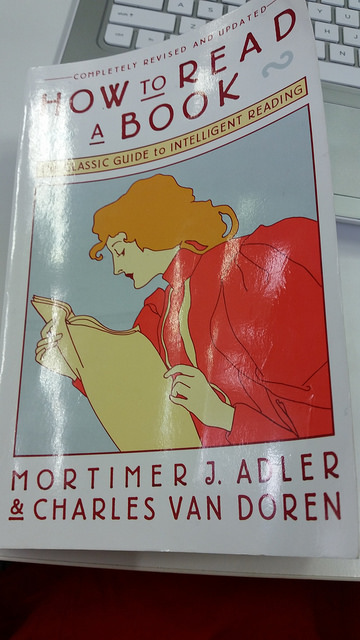 How to Read a Book: The Classic Guide to Intelligent Reading by Mortimer J. Adler
How to Read a Book: The Classic Guide to Intelligent Reading by Mortimer J. Adler
My rating: 4 of 5 stars
This book first came to my attention while I listened to the audio of a seminar that Jim Rohn & friends ran back the early 1990s. In one part of the seminar, each of the eminent speakers went round and round, highlighting the books that had changed their lives.
How to Read a Book was one of them. It wasn’t discussed, it was a throw-away line in amongst a bunch of other information. It was a title that I had missed despite oft-repeated listenings to that very seminar.
While the title will make you snigger, it is the most important book you will ever read. It will teach you to become a discerning, capable, highly functioning reader. After reading and applying the principles in this book to the items that you read, you will read books more thoroughly, with greater understanding, and stronger capacity to learn from books, than anybody else you know.
That’s a huge claim, and it is perfectly justified.
How to Read a Book is a guide to intelligent reading. The work itself was first published in 1940, and was re-issued again the 1970s. It’s never been revisited since; yet the fact that it is immediately useful to you is indication enough that revisitation is not required.
How to Read a Book glosses over the first stage of reading (elementary reading), which we were all taught to engage in before people stopped teaching us to read. At elementary reading, you’re capable of answering comprehension questions, probably to a reasonably high level.
Beyond that level, however, there is also analytical reading, and synoptical reading. Analytical reading teaches you to read books analytically, sequencing the style of reading correctly to get to the greatest understanding possible from a single work. Syntopical reading teaches you to read many books to get to the greatest understanding possible from many books, in order to sequence and discuss the arguments and issues within them, and be able to do so knowledgeably and capably.
In short, it’s the book you wish you had read before you started university.
While there are many books that teach you to speed read, there are no books (besides this one) that teach you why some books are worthwhile speeding through and others aren’t – and how to identify them. It teaches you how to become a truly active reader. It teaches you why the best bookplate of them all is not one about ownership, but the one that your own summary of the work.
And perhaps best of all, it teaches you why you, without any qualifications, without any kudos to your name, are of equal standing to even the greatest of authors; and then why it’s your duty to “talk” back to them.
A highly edifying, immensely referable work, my copy is already dog-eared, underlined, scribbled in, noted, and sequenced. I have also already referred it to more than 10 people that i’ve spoken with in the past two weeks, as well as everyone who follows me on social media.
The authors of the work, Mortimer J Adler and Charles van Doren, argue that books are ‘absent teachers’, and that if you are going to learn effectively from these absent teachers, you have to read in a particular way. They’re absolutely right, and if nothing else it teaches us that you can read all the books you like, but it doesn’t make you well read. It makes you *widely* read, unless you have reached the highest level of understanding possible.
I’m immensely grateful to the authors for this book, one that is hidden and obscure, but is perhaps one of the most educational books of the last century.


RT @BrutalPixie: Possibly the most important book you will ever read: RT @Biodagar How to Read a Book https://t.co/2DJLvCt396 via @biodagar